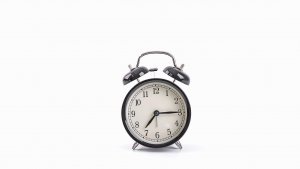Distractions are everywhere - and they all want to take you away from important tasks that improve what you do. Here's how to gain focus and do the most productive day's work ever.
5 Steps For Your Most Productive Day Of The Week
Distractions are everywhere - and they all want to take you away from important tasks that improve what you do. Here's how to gain focus and do the most productive day's work ever.

Growing up in Post-Soviet Russia, scarcity was always a fact of life. That meant I quickly realized the value in conserving, and using the resources we did have as efficiently as possible. It led to an aversion of waste of any kind – be that food, money, or time – and inspired me to approach adult life with an extremely productive and resourceful mindset.
During my childhood, grocery stores were never fully stocked, there weren’t a lot of games, and children’s entertainment as we know it was practically non-existent (except for 15 minutes of cartoons that state television played each evening).
It was these slightly austere conditions though that I have to thank for shaping my focus, persistence and concentration. In today’s world, where adults spend more time on media devices than asleep (OfCom, 2014), these traits have served me well in growing my business and raising my family (and hopefully to adopt a healthier sleeping pattern!).
With the rise of the smart phone and its associated technologies, digital communications streams are taking over as our primary mode of contact. According to research conducted by Wrike, 18% of us work ‘on the go’ for one to two hours per day, checking emails and responding to colleagues on our commute or during personal time.
Although this can help make communications more efficient – it can also damage the value of collaboration and the benefits offered up by face to face meetings and teamwork. With the right kind of tools in place however, it is possible to bring those two positives together and help teams to become more productive, collaborate more effectively and manage their time better. It can also create a happier workforce – which is good for all.
Here are my top tips for putting that into practice:
Start Early
Whether you are a night owl or an early riser, begin your day by working through the background requests you may have. By clearing your inbox, responding to colleagues and updating tasks on your work feed your mind will be clearer and better focused on the task at hand. This will also make it easier to evaluate and organise the priority level of other tasks.
Stop Multitasking
Even though conditioned to admire multitasking when we see it, research shows that for most people, successful multitasking is a myth. In fact, those surveyed for Wrike’s Work Management Report said “Multitasking” is the biggest roadblock to productivity.
By applying your brainpower to more than one task at once, it is possible to reach ‘overdrive’ or even burn out within days, not to mention the increased risk of miscommunication or mistakes. This can also make us miss deadlines and fall behind on important work. It also takes up to 25 minutes to refocus after changing tasks, so multitasking means large amounts of lost time.
Find a Methodology
There are many schools of thought about which methodology is the best, ranging from agile and scrum for teams, to KanBan or GTD for individuals. I personally am a big believer in David Allen’s Getting Things Done method, because it helps me get important information out of my head and stored someplace safe while I work through other tasks. Of course, there are a lot of methodologies to choose from. What’s important is that it works for you, and that you discipline yourself to follow it.
Build a virtual wall against distractions
While technology can help our workflow, it can also provide distractions away from our work, affecting productivity and focus. Apps can be particularly guilty of that by firing out a regular drumbeat of notifications and update requests. By filtering down the number of apps to those that genuinely add value, turning off notifications, you can cut out a great deal of unnecessary digital noise.
For those times where you are really working to full capacity – when you truly are ‘in the zone’ – complete solitude can often help you maintain that presence of mind. You need to remember that once you’ve come out of the zone and landed back to terra firma to turn your notifications back on.
Organise your data
We all have a pool of data that we regularly draw upon to complete our work. These are often files, reports, websites, or other pieces of research that fuel our output. Still, we can't always find these materials easily. Our work management survey also found that 51% of workers said “Missing information” is the biggest cause of stress at work.
When we fail to organize our information into a central place, we waste a lot of time scrambling to find it when we need it most. So create a repository, and make sure you and your team members are actively contributing to keep everything in one place. If you all work together to keep information up to date, you can reduce wasted time by as much to 30%.
Thanks for signing up to Minutehack alerts.
Brilliant editorials heading your way soon.
Okay, Thanks!




